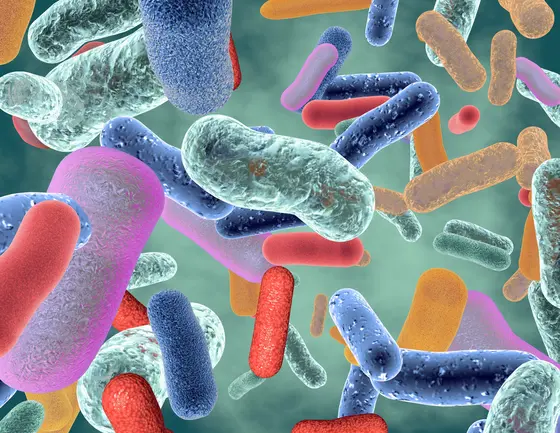The microbiome, i.e. the totality of all microorganisms in our gut, considerably influences our body functions and is associated with numerous diseases. In recent years, researchers have shown that there are links between microbes in the human intestinal tract and the effectiveness of immunotherapies against cancer.
During the last years, physicians have achieved significant treatment success with CAR-T cell therapy, a novel specific form of cellular immunotherapy, for certain leukemias and lymphomas. In this form of therapy, T cells cells are first isolated from the patient's blood. These immune cells are equipped the laboratory with the gene for a special receptor protein that targets a surface molecule of the cancer cells. The T cells with this “chimeric“ antigen receptor (CAR) are then transferred back to the patient and can now specifically recognize and eliminate cancer cells.
However, many questions surrounding this innovative therapy remain unanswered. For example, it is unclear whether the gut microbiome also influences the efficacy of this form of immunotherapy. An international team coordinated by Christoph Stein-Thoeringer and Eran Elinav from the German Cancer Research Center (DKFZ) now wants to investigate this. The Mark Foundation is supporting the project with one of this year's Endeavour Awards. The collaborating partners are Michael Jain and Marco Davila from the H. Lee Moffitt Cancer Center and Research Institute, Florida, and Robert Jenq from the MD Anderson Cancer Center in Houston, Texas.
The team, which includes basic scientists and clinicians, will now conduct a clinical trial to investigate how changes in the microbiome relate to clinical outcomes of CAR-T cell therapy for blood cancers. The researchers want to find out whether the microbiome affects the effectiveness of CAR-T cell therapy in the long term, and whether it is associated with the occurrence of serious side effects, such as on the nervous system. In addition, the team will examine whether the composition of the microbiome may be an indicator for predicting the clinical outcomes of the therapy. “CAR-T cell therapy is costly and sometimes associated with serious side effects. With our research, we want to help tailor this promising method even better to individual diseases,“ says Eran Elinav, who heads a research division at both the DKFZ and the Weizman Institute of Science in Israel.
The Mark Foundation Endeavor Awards, first awarded in 2021, support collaborative research projects that bring together scientists from a broad range of disciplines to improve the prevention, diagnosis and treatment of cancer. The $3 million in funding is awarded to teams of three or more researchers from different research areas whose findings generate advances for cancer patients that could not be achieved through individual efforts.
Founded in 2014 by British billionaire philanthropist Alex Knaster, the Mark Foundation for Cancer Research supports groundbreaking scientific work by individual researchers, multidisciplinary teams and inter-institutional collaborations worldwide, and also aims to bridge the gap between the lab and the bedside through grants and venture capital investments to early-stage companies.



